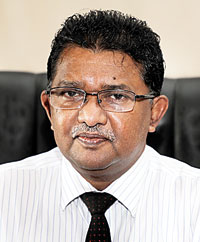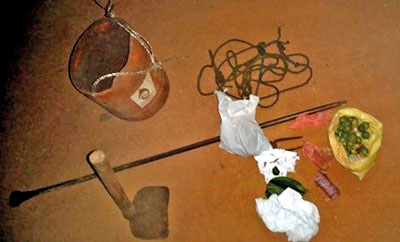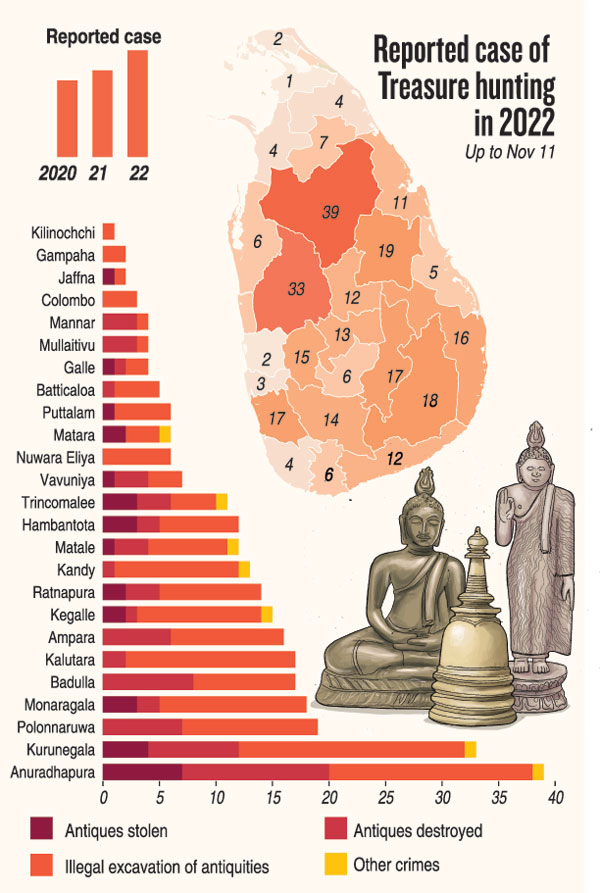News
Bounty hunters causing untold damage
View(s):By Senuka Jayakody
Treasure hunting, which is shrouded in myth and history, remains widespread in Sri Lanka.
The Department of Archaeology Director General Prof. Anura Manatunga blames local exorcists for perpetuating myths about buried treasure.
Treasure hunts are also driven by the money to be made from artefacts, he said. “Their religion is money. They do not respect public wealth or human rights and sell these archaeological items.’’

Prof. Anura Manatunga
He reckons that the poor people who are arrested are being used by the wealthy to look for artefacts.
Sri Lanka Customs said smugglers of antiques and archaeological items are regularly arrested.
“There is a demand for archaeological items and antiques in foreign countries involving people such as antique collectors to whom the cunning businessmen of this country cater to,’’ said Sudantha Silva, the spokesman for Sri Lanka Customs.
Prof. Manatunga said treasure hunters cause permanent damage to archaeological sites.
He said that despite controversies about sites in North and East, there are comparatively fewer incidents of treasure hunting compared with Anuradhapura.
The department is ill equipped, he said. The legal division had just three lawyers. There is only one vehicle to help officials monitor three districts, Vavuniya, Mannar and Mullaitivu.
The department is responsible for the protection of archaeological sites and a complaint is filed with the police if an incident is reported.
Suspects arrested by the police are brought to a court. Treasure hunting is considered as a non-bailable offence. Even if evidence is not present, intention is also considered in meting out punishment.
Prof. Manatunga said: “This is a matter of education. Influential people should be educated first, since education is fundamental to preventing such actions”.
Welcoming the budget proposal for the history institution he said: “Sri Lanka had a good tradition of written history like the Mahavamsa. The Government initiative is good.’’
The SSP of the Monaragala division, Sisila Kumara Herath, blames myths for the prevalence of treasure hunting.
“Someone will tell people that there is treasure and they blindly go and dig up. It has been two years since I came here, and no treasure hunter who was caught in my time had found any treasure,’’ he said.
In a recent treasure hunting incident, eight suspects were arrested on October 25 in a house in Kadawatha. The owner of the house was involved.
The Kadawatha police said there is a rock below the house, with a small canal running in the middle. This has been pointed out by a ‘Kapuwa’ from Kandy, who had been told “by his grandfather in a dream”, about the treasure.
When the police arrived, they had noticed that all eight suspects, including the owner and the ‘Kapuwa’ had lighted lamps and prepared chickens for a sacrifice.

Digging tools and offerings were found in an STF raid carried out in the Galoruwa mountain area between the villages, Bokkabedda and Lathugala. Pic by M.A. Pushpa Kumara
The suspects were taken to court the next day, on October 26, and were remanded until November 28.
Another recent incident was in the Padaviya tank forest reserve, where the Special Task Force (STF) arrested four suspects for digging up archaeological items, causing damage to the Padaviya tank bund. A raid was done by the Kebithigollewa Camp of the STF on November 20 at Galoruwa mountain area in-between the villages, Bokkabedda and Lathugala, where digging tools and offerings were found.
The suspects were handed over to the Padaviya police and were taken to court on November 21. They were remanded until November 30.
The Padaviya police said treasure hunting is common in the area.
Also, the Pusulpitiya Raja Maha Vihara has complained of seven treasure hunting and robbery incidents in the temple. A five foot ivory ‘Makara thorana’ (dragon gate) gifted by King Bhuwanekabahu IV of the Gampola era, had been stolen.
King Dutugemunu’s first stupa, built in the temple, had also been dug up by treasure hunters and two relics had been stolen in 2017. In addition, a golden statue has been stolen and the ‘Dewatha Kotuwa’ (square of the gods) in the temple had been dug up.
Ven Narampanawe Sujatha Thera, said a case is continuing. Suspects have not been arrested and the archaeological items unrecovered.
The police spokesman, Nihal Thalduwa, said two incidents had been reported on November 15, and a man had dug up his house in Kiribathgoda in search of treasure.
The police can arrest suspects and produce them in court under the Antiquities Act No. 9 of 1940, which was amended in the Act No. 24 of 1998, where fines and punishments were increased. Archaeology Department officials provide a report on the presence of artefacts in the area concerned, which would be used as evidence against the suspects.
“Various myths may influence people to commit the majority of the treasure hunts. While people also conduct treasure hunts motivated by money, some may do so to satisfy myths,” the spokesman said.

| Spirit guardians A common myth about treasure hunting is the belief of a ‘Bhairava’ (Tamil: Vairavar), a spirit known to protect buried items, including treasure and gems, also worshiped by Hindus as a god. Professor Lenagala Siriniwasa Thera, the Dean of the Faculty of Language Studies of the Buddhist and Pali University of Sri Lanka stated that the belief runs back to the Anuradhapura period. “When kings or regional rulers bury treasure, they kill a person in front of it, after creating desire for the treasure in the person, who is then said to become a Bhairava and protect the treasure”, the Thera added. The Bhairava had to be satisfied with offerings, which range from chickens to humans, which is usually done by a ‘kapuwa’ (shrine priest) or a ‘kattadiya’ (exorcist).
| |
The best way to say that you found the home of your dreams is by finding it on Hitad.lk. We have listings for apartments for sale or rent in Sri Lanka, no matter what locale you're looking for! Whether you live in Colombo, Galle, Kandy, Matara, Jaffna and more - we've got them all!

